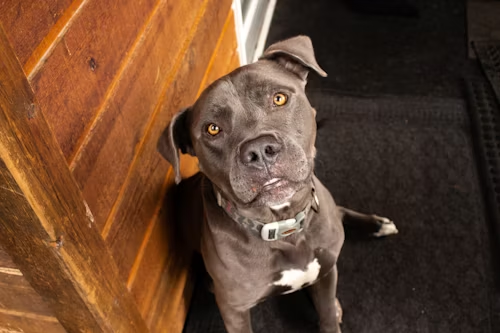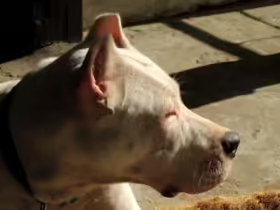The Pit Bull Terrier is a breed known for its powerful physique, high energy, and deep loyalty. Unfortunately, misunderstandings and myths have also cast a shadow over this breed, often labeling it as “dangerous.” In reality, the Pit Bull is a loving and loyal companion when raised with proper care, training, and understanding.
This blog delves into the essential aspects of the Pit Bull Terrier, including temperament, training, and the care it needs to thrive as a well-behaved, happy pet.
Table of Contents
- Breed Overview
- Temperament and Personality
- Training Needs
- Exercise Requirements
- Nutrition
- Health Concerns
- Creating a Safe and Happy Home
- Final Thoughts
1. Breed Overview
- Breed Group: Terrier Group
- Height: 17 to 21 inches
- Weight: 30 to 60 pounds
- Lifespan: 12-16 years
- Coat Type: Short and sleek, low-shedding
Pit Bull Terriers were originally bred for strength and agility. Their ancestors were used in hunting and farming, but they have since transitioned into popular companion animals. Recognized for their muscular build, intelligence, and boundless energy, they are capable of excelling in various activities such as obedience, agility, and therapy work.
2. Temperament and Personality
The temperament of the Pit Bull Terrier is often misunderstood. Let’s clear up some of these misconceptions and highlight their positive qualities:
- Affectionate and Loyal: Despite their tough appearance, Pit Bulls are known for their deep attachment to their families and are often called “nanny dogs” because of their patience and tolerance with children.
- Confident and Energetic: They are outgoing, eager, and confident. This confidence, paired with high energy levels, makes them a lively companion.
- Intelligent and Trainable: With the right guidance, Pit Bulls learn quickly and are eager to please, making training rewarding.
- Potential for Dog Aggression: While not inherently aggressive, some Pit Bulls may display aggression toward other dogs if not properly socialized.
Key Tip: Socializing a Pit Bull Terrier from a young age is crucial to prevent behavioral issues related to fear, anxiety, or aggression.
3. Training Needs
Proper training is essential for a well-adjusted Pit Bull Terrier. They are highly intelligent and responsive, which can make training both effective and enjoyable.
- Positive Reinforcement: Use treats, praise, and positive interactions to reinforce good behavior.
- Early Socialization: Expose your Pit Bull to different people, places, and animals early in life.
- Obedience Training: Teaching commands like sit, stay, come, and leave it is essential for Pit Bulls. They benefit from knowing their boundaries.
- Controlled Energy: Because of their high energy, regular training sessions keep them engaged and prevent them from channeling their energy into unwanted behaviors.
Tips for Successful Training:
- Consistency: Keep training consistent with daily routines and commands.
- Patience: Avoid harsh corrections. A calm, patient approach is more effective.
- Engagement: Keep training sessions interesting and active to hold their attention.
4. Exercise Requirements
Pit Bulls are high-energy dogs and require daily physical and mental stimulation.
- Physical Exercise: Aim for at least 60 to 90 minutes of active exercise each day. This can include walking, jogging, or playing in a secured yard.
- Mental Stimulation: Mental exercise is equally important. Use puzzle toys, obedience drills, and agility exercises to keep them mentally engaged.
- Playtime with Supervision: If you plan on taking your Pit Bull to a dog park, ensure they are well-socialized and comfortable with other dogs to avoid any conflicts.
Regular exercise not only helps manage their weight but also curbs destructive tendencies.
5. Nutrition
A balanced diet is essential for keeping your Pit Bull Terrier in good health.
- Protein-Rich Diet: Pit Bulls thrive on high-quality dog food rich in protein to support their muscle mass and energy levels.
- Avoid Overfeeding: Due to their athletic build, it’s essential to maintain a healthy weight. Overfeeding can lead to obesity and strain their joints.
- Joint Supplements: Since Pit Bulls are prone to joint issues, consider supplements like glucosamine or chondroitin as they age.
- Hydration: Always provide access to fresh water, especially after intense play or exercise sessions.
6. Health Concerns
While generally healthy, Pit Bulls can be prone to certain genetic and breed-specific conditions:
- Hip Dysplasia: A common condition that affects the hip joints, leading to discomfort and mobility issues.
- Allergies: Pit Bulls often have skin sensitivities. Watch for signs of itching, redness, or hotspots.
- Heart Disease: A few heart conditions are found in the breed, so regular vet checkups are recommended.
- Hypothyroidism: This condition can lead to weight gain, lethargy, and skin issues.
Preventative Care: Schedule regular checkups with your veterinarian, keep vaccinations up to date, and maintain a routine flea, tick, and heartworm prevention plan.
7. Creating a Safe and Happy Home
A Pit Bull Terrier will thrive in a safe, structured, and loving environment. Here’s how to create the right home setup:
- Provide Clear Boundaries: Establish rules from the start. Pit Bulls respond well to structured environments.
- Socialization is Key: Continue socialization throughout their life to keep them comfortable with other animals and people.
- Create a Safe Space: Ensure they have a designated resting area, such as a bed or crate, where they can retreat when needed.
- Be a Responsible Owner: Pit Bulls are loyal dogs, but they require responsible handling. Supervise them during play, and be mindful of interactions with other dogs.
Avoid Rough Play: Avoid rough or aggressive play, as it may encourage unwanted behaviors.
8. Final Thoughts
The Pit Bull Terrier is a loving, loyal, and energetic breed that thrives with attentive, responsible care. While the breed often has an unfair reputation, it is essential to remember that every dog is an individual. With the right guidance, training, and socialization, a Pit Bull can be a gentle, loyal, and wonderful companion.
If you’re considering bringing a Pit Bull into your home, be prepared to invest time and effort into training, exercise, and care. In return, you’ll find a devoted friend who will enrich your life in countless ways.











Leave a Reply